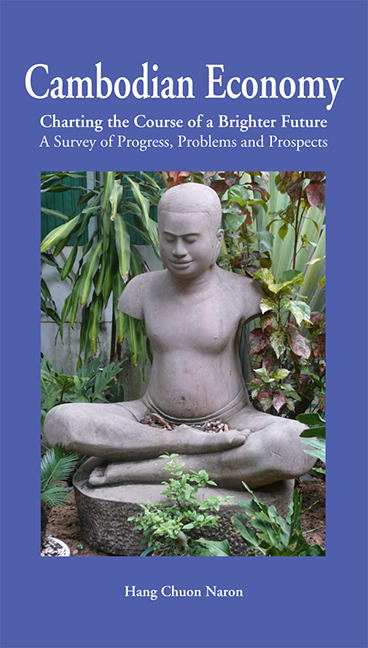 Cambodian Economy
Cambodian Economy Published online by Cambridge University Press: 21 October 2015
To assess the economic situation in Cambodia, we need to have a clear understanding of its past. Cambodia has moved in stages, many traumatic, from a position as a war-torn, conflict-ridden, isolated country to one of stability, which is underpinned by a gradual progress to a market economy. Notwithstanding the significant progress that has been made since 1993, when the UN- supervised elections were held, the country still faces many daunting challenges in its efforts to improve the livelihood of its people. In a larger sense, Cambodia's contemporary economy is the legacy of its troubled past and political conflict, during which the foundations for growth and development — physical, social, economic, and human — have been devastated.
After the Paris Peace Agreements were signed on 23 October 1991, Cambodia moved swiftly to integrate itself into the international community. Cambodia's membership in ASEAN, WTO, and the East Asia Summit, as well as cooperation within the framework of the Greater Mekong Sub- Region (GMS) provided great opportunities to reform the investment and foreign trade regime. This was done by focusing on the liberalization and decentralization of the decision making process, reducing impediments to investments, implementing reform programs and initiating the modernization of the national economy and upgrading its competitiveness to the regional and international standards.
The book entitled Cambodia Economy: Charting the Course of Brighter Future, A Survey of Progress, Problems and Prospects, written by HE Dr Hang Chuon Naron, Secretary of State, Ministry of Economy and Finance of the Royal Government of Cambodia, provides useful accounts about the current economic landscape and emerging challenges facing Cambodia that has evolved over the years.
This book also assesses rigorously the stage-by-stage evolution of all the important economic sectors of the country and the emerging vulnerabilities that the Cambodian economy has experienced since 1993, and as the result of the global economic and financial crisis starting in 2008. It also provides rich analysis of the economic policy making process as well as policy formulation and implementation, and a sharper focus on the priorities which should be addressed for Cambodia's future competitiveness and sustainable growth.
To save this book to your Kindle, first ensure [email protected] is added to your Approved Personal Document E-mail List under your Personal Document Settings on the Manage Your Content and Devices page of your Amazon account. Then enter the ‘name’ part of your Kindle email address below. Find out more about saving to your Kindle.
Note you can select to save to either the @free.kindle.com or @kindle.com variations. ‘@free.kindle.com’ emails are free but can only be saved to your device when it is connected to wi-fi. ‘@kindle.com’ emails can be delivered even when you are not connected to wi-fi, but note that service fees apply.
Find out more about the Kindle Personal Document Service.
To save content items to your account, please confirm that you agree to abide by our usage policies. If this is the first time you use this feature, you will be asked to authorise Cambridge Core to connect with your account. Find out more about saving content to Dropbox.
To save content items to your account, please confirm that you agree to abide by our usage policies. If this is the first time you use this feature, you will be asked to authorise Cambridge Core to connect with your account. Find out more about saving content to Google Drive.